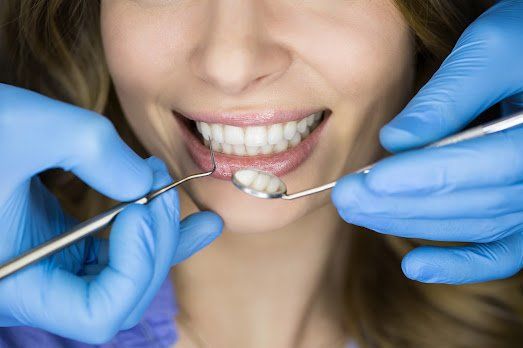What Occurs During Dental Cleaning?

Healthy teeth play a vital role in your life. The teeth help you to eat food, speak clearly, and maintain your facial structure. Also, you can have an attractive smile and be more confident with healthy teeth.
Regular dental cleaning improves your teeth's health and appearance. Know what happens during dental cleaning.
Dental X-Rays
The dentist may start with a dental x-ray to examine your teeth's status. In this case, the dentist will use weak radiation rays to get pictures of your teeth's internal condition. As a result, the dentist can quickly identify dental problems, such as tooth decay.
X-ray radiation is safe and won't negatively impact your health. In addition, the dentist may place protective equipment over the rest of your body to block any stray radiation. However, pregnant women might have to skip the dental x-ray during teeth cleaning.
The dentist will also use small tools to check the exterior condition of your teeth. The small tools include a mirror and hook.
Dental Scaling
Your dentist may recommend dental scaling to make your teeth healthy and firm. Scaling involves the removal of unwanted particles from the surface of your teeth. Stains and plaque are the most common particles. Continuous and unchecked accumulation of these particles can lead to teeth removal or gum infection.
Scaling is necessary because flossing or a toothbrush can't reach all the parts of your teeth. Dental scaling targets hardened deposits on the tooth surface. Your dentist will probably first remove all hardened deposits on the tooth above the gumline. The dentist will then shift to the part of the tooth below the gumline and clean all the way to the pocket.
Since scaling can be painful, the dentist will numb the affected area. In addition, scaling may require multiple visits to the dentist.
Root planing and tooth polishing may also accompany dental scaling. Root planing typically leverages electric and manual devices. These processes will protect your teeth from further hardened plaque deposits.
Deep Floss
You probably already floss your teeth on your own, but the dentist may conduct a deep floss. The deep flossing will go deeper and may reach areas of your teeth that your regular flossing rarely touches. Your teeth may become sensitive or bleed during a deep floss, but you usually will heal in no time.
Mouth Rinse
Once the dentist removes all dirt from your teeth, the dentist will rinse your mouth. Your dentist will either use a cosmetic or therapeutic mouthwash during rinsing. A cosmetic mouthwash can prevent bad mouth smell but can't fight bacteria in your mouth. On the other hand, a therapeutic mouthwash not only contains a foul odor but may stop bacterial infections.
The mouthwash will rinse all parts of your teeth, including those that flossing missed. However, the dentist may not use mouthwash for children under six. The children can swallow the mouthwash and develop medical problems.
Fluoride Application
Finally, the dentist may apply a fluoride-based treatment to your teeth. The substance can be varnish, gel, foam, or solution. A fluoride application is crucial because it kills bacteria and may prevent tooth decay. In addition, fluoride helps the body process minerals that improve dental health.
A fluoride application is also crucial because it can slow down the progress of cavities. Moreover, fluoride can extend the lifespan of baby teeth.
Dental cleaning is one of the best ways to maintain good oral health. The process can go on smoothly if you are in a relaxed and comfortable space. Fortunately, you can find such a space at Pittsburgh Dental Spa. We offer a relaxed atmosphere with recliner chairs and a ceiling-mounted TV. Contact us for your dental services.
Reviews from real patients:
Carmen up front is the nicest person ever! First time I met her she was running around doing many jobs and still being oh so sweet. Dr. Kelly is just as amazing! They truly make you feel comfortable and the atmosphere is amazing. Highly recommend!!
Brianna Bangs
OUR LOCATION
Address: 6502B Steubenville Pike Pittsburgh, PA 15205















